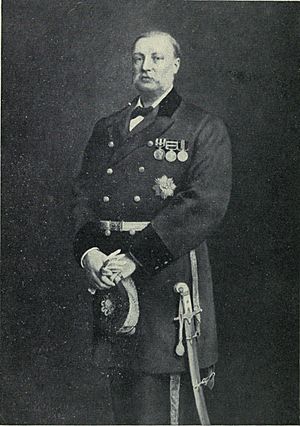Robert Groves Sandeman facts for kids
Quick facts for kids
Robert Groves Sandeman
|
|
|---|---|
 |
|
| Born | 25 February 1835 |
| Died | 29 January 1892 (aged 56) |
| Occupation | British Indian Army officer and colonial administrator |
| Relatives | Walter Massy-Greene (nephew) |
Sir Robert Groves Sandeman (1835–1892) was an important British officer and administrator in India. He was known for his work in an area called Balochistan. There, he created a special way to keep peace among the local tribes. This system lasted for a long time, until India became independent in 1947.
Contents
Early Life and Military Service
Robert Sandeman was born on February 25, 1835, in Perth, Scotland. His father was also a general. Robert studied in Perth and at the University of St Andrews.
In 1856, he joined the 33rd Bengal Infantry, a British Indian Army unit. During the Indian Rebellion of 1857, his regiment was disarmed. He then helped capture Lucknow as an adjutant, which is like a chief assistant, for another army group. After the rebellion ended, he joined the Punjab Commission, a government body.
Working with Tribes in British India
In 1866, Sandeman became a district officer in Dera Ghazi Khan District. This is where he first showed his skill in working with the Baluch tribes. He was one of the first British officials to try to work with tribes living beyond the main British-controlled areas.
He was very good at this because he understood the tribesmen. He was able to build trust and manage them well. In 1871, he was given control over the Marri, Bugti, and Mazari tribes. These tribes lived in the Sulaiman Hills and were often fighting.
Sandeman's Peace System
In 1876, Sandeman helped create the Treaty of Kalat. This agreement set up how the British government would work with the Khan of Kalat, a local ruler. In 1877, Sandeman became the main British representative in Balochistan. He held this job until he died.
Sandeman created a new way to keep peace in Balochistan. It was sometimes called 'Sandemanization'. He gave money to tribal chiefs who helped keep order. He only used British soldiers when it was really needed. This system helped keep the region peaceful for many years.
Impact of Sandeman's Work
During the Second Anglo-Afghan War in 1878, Sandeman's good relationship with the tribes was very important. It helped keep supply routes open to Kandahar. It also helped control the tribes after a British defeat at Maiwand. Because of his efforts, he received a special honor in 1879.
In 1889, he took control of the Zhob valley. This was a smart move because it opened up the Gomal Pass through the Waziri area for trade. Sandeman's system worked very well for the Baluch people. He helped turn Balochistan from a troubled area into a peaceful and organized province within British India.
Later Life and Legacy
Sir Robert Sandeman passed away in Bela on January 29, 1892. His work had a lasting impact on the region.
Historians have studied Sandeman's methods. Some believe he brought order to the area. Others point out that he used existing disagreements between local rulers and chiefs to increase British power. They also note that there were still some uprisings against British rule during his time. These had to be stopped with force.
Images for kids
 | George Robert Carruthers |
 | Patricia Bath |
 | Jan Ernst Matzeliger |
 | Alexander Miles |


